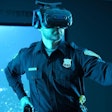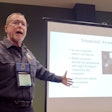There’s one question that all prospective students ask before they sign up for a program that will allow them to complete their college degree online: Is this really any good?
Scott Harr, a retired Minnesota police chief who now heads the online criminal justice program at St. Paul-based Concordia University, has a clear answer: “For some students, it’s better.”
Worldwide Student Body
The students who get the most out of online college degree programs are basically people like cops. They are older than traditional students. They have demanding careers, and many of them have family responsibilities. That means these students can’t get to class every week or every night to attend on-campus programs.
By taking online courses, these non-traditional college students can schedule their own study times, and they can enroll in classes at institutions far from their homes. Consider Harr’s Concordia University; it’s a small school in St. Paul with a traditional campus and a traditional student body. But online, it is massive and worldwide.
“In the criminal justice program alone, we have students from all over the country and from Canada taking courses online,” Harr says. “We even have students who are deployed in actual combat zones. If they are able to get to a computer, they can keep up with the class.”
The directors of online criminal justice programs are very proud of the fact that many of their students are serving cops and soldiers who want to complete their degrees and are willing to sacrifice their free time to do so.
They are also open to offering credit for professional experience and for certain types of military and law enforcement training. This speeds the student toward his or her degree.
“In general, we accept credit from a variety of sources, including previous college-level study and military or law enforcement training that has been certified by ACE (American Council on Education),” says Bill Stewart of Excelsior College. “Excelsior has even worked under a couple of large DOJ grants to evaluate programs at police academies and corrections academies for credit.”
No Place to Hide
Despite what many might think, online college programs are not easy. In some ways, they may be tougher than on-campus classes.
Consider that the typical on-campus night class probably has a minimum of 30 students. The class meets once per week for three hours, or it meets twice per week for 90 minutes each class. In such a classroom dynamic, the instructor is likely only to take notice of certain students, the ones who actually pipe up in the class. The others don’t really engage, but they still can pass and even achieve B or better grades.
You can’t hide in an online class and skate your way to a B. The format requires your participation.
The typical online criminal justice class consists of directed readings of selected texts, audio lectures, classroom discussions held through online bulletin boards and instant messaging sessions, and term papers. It’s a lot of work.
James Staley, a Palm Springs, Calif., security consultant, just completed the online Homeland Security program offered by Albany, N.Y.-based Excelsior College. He says that even though he had taken classes through a variety of on-campus programs and on-base programs in the Marines that Excelsior’s courses were challenging. “The online courses are more difficult. You have to schedule your own time. It’s not like you can just show up and listen. You have to read and do a lot of stuff on your own,” he says.
The workload in most online college programs is intense, but many students go the extra mile. “ I’ll post a case study,” says Mike Butera, director of Bellevue University’s new investigations program offered through the department of criminal justice. “The assignment will be to read it and write a 500-word essay on what steps you would take to investigate the case. Then we post the assignments and the students comment on them. Sometimes we have 300 postings on one assignment. It’s amazing. The discussion thread keeps going 24 hours a day.”
Instructor Quality
Butera is an example of the type of instructor who is drawn to teaching online college courses in criminal justice. He just retired from the Omaha Police Department as the captain in charge of the criminal investigations bureau. He teaches at both the University of Nebraska at Omaha and at Bellevue, which has a traditional campus in the Omaha suburb of Bellevue, Neb. He was skeptical about online education when he was first approached by Bellevue. “I wasn’t sure how or if it was going to work,” he says. “But I have become an absolute believer in the quality of online education.”
Online degree programs require a rethinking of educational strategies by not only the students but also the instructors and the institutions that establish such programs.
“We use a lot of adjunct faculty in the online criminal justice programs,” says Concordia’s Harr. “The students in that program have experience, therefore they need to learn from people who have experienced what they are teaching in the area of their expertise. I probably have every doctoral level cop in the state teaching in this program.”
Balance is the Secret
In addition to being experienced in the field and willing to learn how to teach online, instructors must also realize that they are not teaching 18-year-olds. “Our faculty are selected because of their desire to help adult learners who are returning to school,” says Harr.
It’s also important that adult returning students understand that they can’t approach their studies in the same way as 18-year-olds right out of high school. “It’s important that a returning student maintain balance in his or her life,” Harr says. “Everybody wants a 4.0 average when they start, and we want them to be successful. But as an adult student, you have to balance self, family, work, and school. You need to stay sharp and keep yourself alive on the job more than you need an A average in your classes.”
Harr says balance is the hardest thing for Concordia’s students to maintain because they are so invested in their study. He’s had students take their coursework on vacations with them even when he begged them to take a break.
Shop Around
The dedication that Harr has witnessed is typical of adult students returning to school for their degrees. Unlike traditional students, adults aren’t in college just as a place to transition from high school to career; they are enrolled with a mission: get a degree and move up.
Also, returning adult students tend to be more invested in their educations because they are footing the bills. And it’s not cheap.
Bellevue’s 48-week investigation program is $12,000. Excelsior charges $290 per credit hour; Concordia, $375. Books and materials are extra.
A college education is a substantial investment, whether it is undertaken at 18 or at 48. Which is why Concordia’s Harr minces no words when he advises students to shop for what they really want. “I encourage students to be good consumers and check out the other programs. You have to very carefully consider your options,” he says. “And we want our prospective students to achieve their goals even if that means they should enroll at another institution. I just referred a student to two other programs.”
The beauty of online education is that what and where you study is not determined by geography. Just a few decades ago, if you wanted to study investigations and a local school didn’t offer that program, you had two options: Move to an area with a school that did offer the program or study something else. Now even if you’re in Florida, you can study at a school located in Nebraska. That’s a great benefit of the Internet.
Unfortunately, as with everything else on the Internet, there are disreputable schools ready to take your money. To protect yourself against scams, do your homework.
Check the accreditation of any school you consider. Good schools are regionally accredited. That means that the degree you achieve at that school is recognized by graduate schools, including law schools.
Can you really go on to law school with a degree earned online? “Absolutely,” says Harr. “We have a number of students who are studying at law schools, Ph.D. programs, and other graduate schools.
“You’re not going to receive a diploma that says ‘online student,’” Harr adds. “You receive the very same degree that Concordia has been awarding for 114 years.”
















